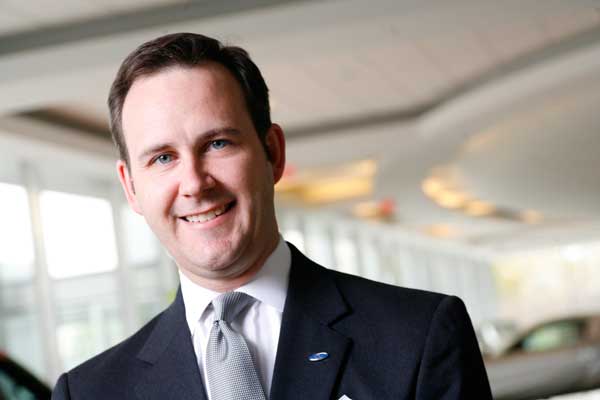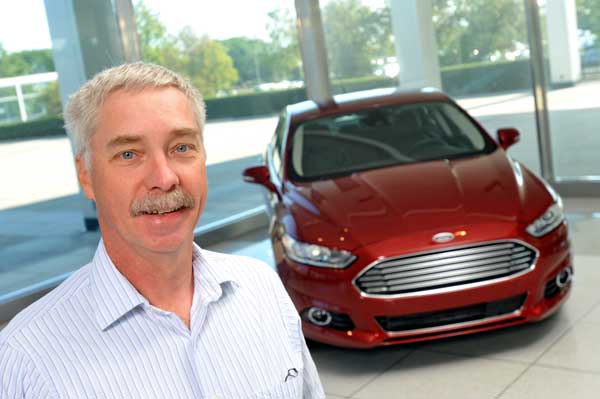Ford Motor Co. is a pioneer in social media marketing and a proponent of enterprise social networking. But its plan for a unified social business strategy is still a work in progress.

10 Great Social Features For Microsoft SharePoint 2013
10 Great Social Features For Microsoft SharePoint 2013 (click image for larger view and for slideshow)
Ford Motor Co. is a pioneer in social media marketing and in enterprise social networking, but if social business means achieving an end-to-end strategy for the uses of social media and social technology, then Ford is just getting started.
"I don't think anybody's really figured it out completely yet," said Scott Monty, global director of social media at Ford. "A lot of people are talking about social business transformation, but to actually execute it at the enterprise level is really, really hard."
Monty is best known for his role in formulating the company's social media marketing programs and as the editor of the Social Media Marketing Blog. He is also user #1 on Ford's Yammer enterprise social network, which has grown to have about 17,000 registered users (about 10% of them active participants). Ford is using Yammer to prove the business value of internal social networking but has not necessarily made a long-term commitment to it as the technology of choice. Meanwhile, Monty is working on a broader social business strategy for the company, although he adds "you've caught us right at the beginning of it."
[ Red Robin CIO Chris Laping, our social business technology leader of the year, will join an onstage discussion of The BrainYard's Social Business Leaders at E2 Innovate, Nov. 12-15, Santa Clara Convention Center. ]
I spoke with Monty as part of our research for a feature on The BrainYard's Social Business Leaders feature that will appear in the Nov. 12 issue of InformationWeek. Although Ford did not nominate itself, I'd spoken with Monty before about Ford's early use of Google+ (where Ford had a company page before other companies were allowed to establish one) and about the auto maker's use of Google+ Hangouts. I'd also seen him speak at Dreamforce, where Ford was highlighted as a prominent user of the Salesforce.com Marketing Cloud. After stumbling across a marketing case study on Ford's use of Yammer, I was curious to know whether Ford was trying to pull together these different aspects of social.
Absolutely, Monty said, because the concept of social business meshes so well with the One Ford strategy that CEO Alan Mulally established when he became Ford's CEO in 2006.
"What it was designed to do was break down all the silos around the company around the world," Monty said, noting that at the time some car designs would be introduced in Europe and never make it to the U.S., while other functional divisions impeded collaboration for people who ought to be working together. Mulally wasn't thinking in terms of social technologies when he first articulated this vision, but they present "just an amazing opportunity to start bridging these gaps," Monty said.

Scott Monty
Since joining Ford in 2008, Monty has been seeking out opportunities to use social media to distinguish Ford from the competition. As he said onstage at Dreamforce in September, "we decided it was time to start showing the public that there are people like them in Ford Motor Company." One milestone: When Ford introduced a redesigned edition of the Ford Explorer in 2010, it skipped the usual auto show and auto journalist briefings route in favor of simultaneous announcements in eight cities -- and on Facebook. The Facebook campaign, created using tools from Buddy Media (now part of the Salesforce Marketing Cloud) prominently featured videos about the vehicle from the product managers and engineers, as well as CEO Mulally and celebrity spokesman Mike Rowe. The Explorer "reveal" campaign attracted 99 million social media impressions, became the #1 trending topic on Twitter, and the #2 search for the day on Google.
"We took that as indicator we could be successful in social at the scale we were used to in traditional media," Monty said.
Meanwhile, one of the benefits of bringing social networking inside the company was it shortcut traditional processes. When Monty was planning what became the Summer of Taurus campaign in 2009 (to unveil the 2010 model of that car), he wrote a rough outline of what he wanted and posted it to Yammer, asking whether it could be accomplished by IT or needed to be contracted out. "He basically said, I need something to bring this technology together and that technology together, and I don't know where to start," recalled IT architect Ed Krebs, part of an advanced technologies group that oversees the Yammer implementation. Within a week, one of the participants to that discussion -- from an IT group that normally didn't work with marketing -- was able to show Monty a prototype he had built in his spare time, which evolved into a mashup with Bing Maps. The social conversation cut short what could have been a months-long process of gathering requirements for a traditional IT project, while also avoiding the expense of hiring outside developers, Krebs said.

Ed Krebs
Ford employees have lots of other collaboration tools available, Krebs said (one coworker told him: "If you give me one more productivity tool, I won't be able to do my job"). But social networking within the company is something different. "It's much more cross-organizational as a way of identifying issues and allows people who otherwise might not have been engaged to bring in new solutions," he said.
While the Yammer network has racked up success stories, Krebs said it is "right now only semi-active," partly because IT is in the midst of evaluating whether it is the right long term solution. "We don't want to go whole hog until we know we're on the right product."
One hesitation: Yammer's lack of support for standards like OpenSocial, a method of application embedding that's so far been embraced most enthusiastically by Jive Software and IBM. Krebs team has been running some experiments on Shindig, an open source implementation of the OpenSocial specifications. Krebs thinks the real success of OpenSocial will come when it is pervasive -- for example, with engineers able to carry on social conversations from within the context of a computer-aided design (CAD) tool.
While it doesn't support OpenSocial, Yammer is promoting an alternate Enterprise Graph approach to social application integration, based on extensions to Facebook's Open Graph. Krebs said he considers that a more proprietary approach and in any case decided it was more appropriate to do some initial experiments on Shindig than to "get wrapped up in Yammer's weekly releases."
Because he works in an advanced technology branch of the IT organization, "I always have three or four things running back in the lab," Krebs said. In the end, Yammer "might or might not be a winner, but we didn't want to do was have 50 people on Yammer, 50 people on Socialcast, maybe 50 people on some other tool. We thought it was more important to get critical mass than it was to do tools selection" at this stage of the game, he said.
"Whether or not we stay with Yammer as a platform, the behavior is already ingrained," Monty agreed.
Meanwhile, Ford is thinking through ways to get its employees engaged in social communication not only internally but with the rest of the world. Through its @Ford Online the company publishes content such as news items that employees are encouraged to share with friends and relatives as they see fit. "When you think about it, we encourage them to talk friends and families and neighbors in real life, analog life, all the time," Monty said. "Now we're simply doing the same thing on a digital level, rather than on an analog level."
Krebs said Ford probably can't embrace this concept quite as fully as companies like Best Buy, which is famed for encouraging employees to troubleshoot consumer technical support questions on Twitter. If a Ford engineer handed out ideas on vehicle modifications that turned out to be dangerous, the company wouldn't want to be liable, he said.
"What Scott is leading is more an ambassador program, where we're working out how Ford employees can talk about Ford, not as an official spokesperson but as proud employees," Krebs said. There are other "fairly straightforward" social media contexts, such as participating in professional groups on LinkedIn, where Ford is advising employees on what they can and can't say in those forums, he said. "We're right on the cusp of being able to do some of that in a more dramatic way."
So is Ford a leader or a laggard? Maybe a little of both, Krebs said. "We've got a lot of elements that are well thought out, where I think we're ahead of where a lot other companies are. But just like any other large company, we've got a bigger risk footprint. We may move slower than much smaller companies, or companies in different industries, but that's ok."
Follow David F. Carr on Twitter @davidfcarr. The BrainYard is @thebyard and facebook.com/thebyard
The business world is changing. Is your company ready? E2 Innovate, formerly Enterprise 2.0, is the only event of its kind, bringing strategic business professionals together with industry influencers and next-gen enterprise technologies. Register for E2 Innovate Conference & Expo today and save $200 on current pricing or get a free expo pass. Nov. 12-15, 2012, at the Santa Clara Convention Center, Silicon Valley.
About the Author(s)
You May Also Like







